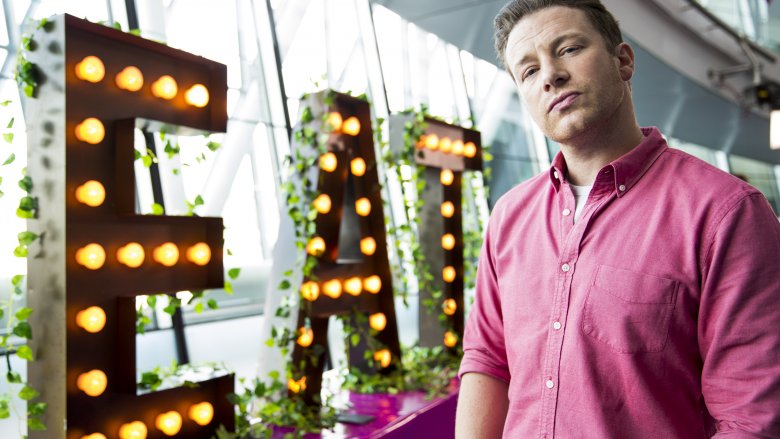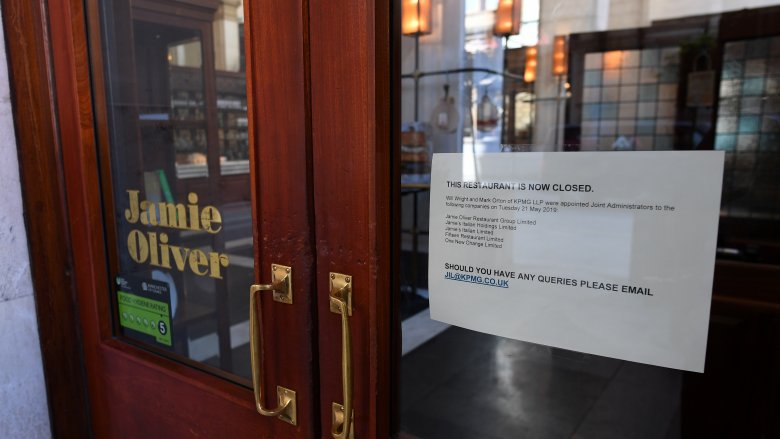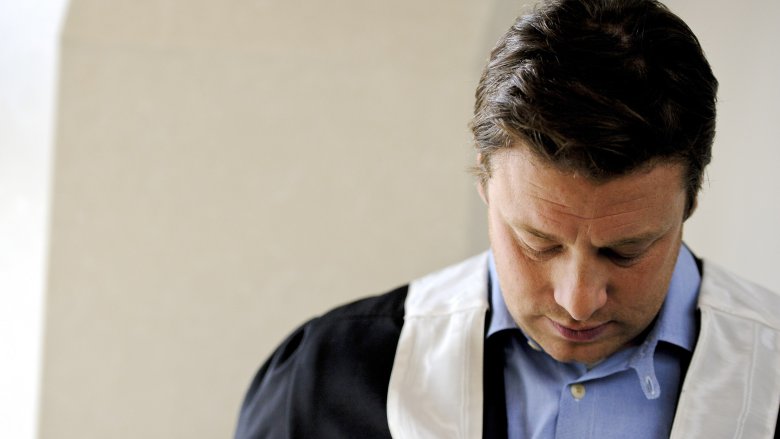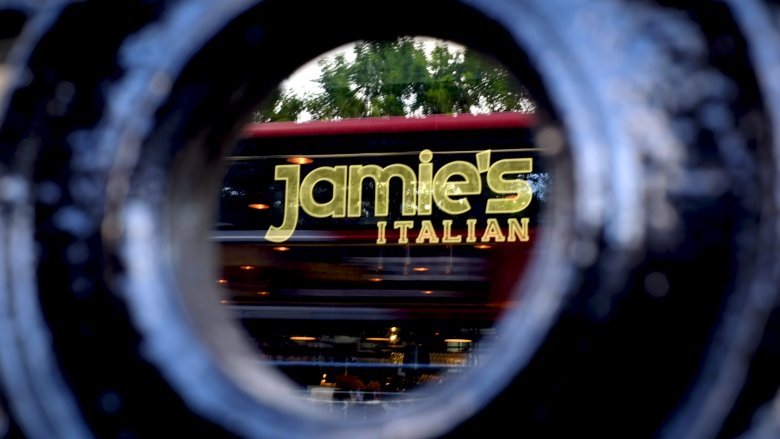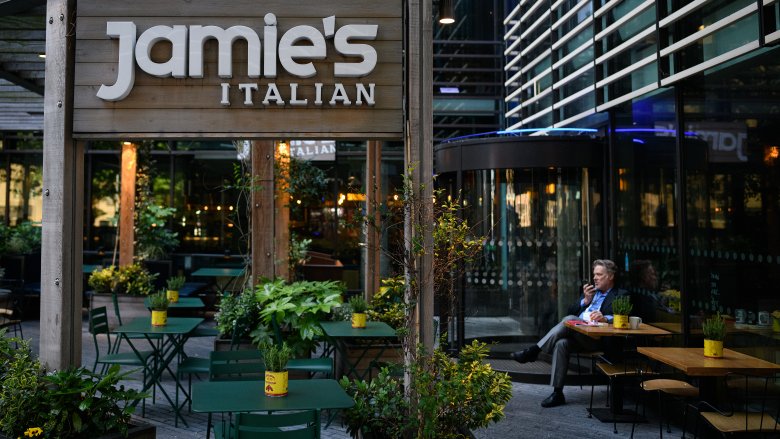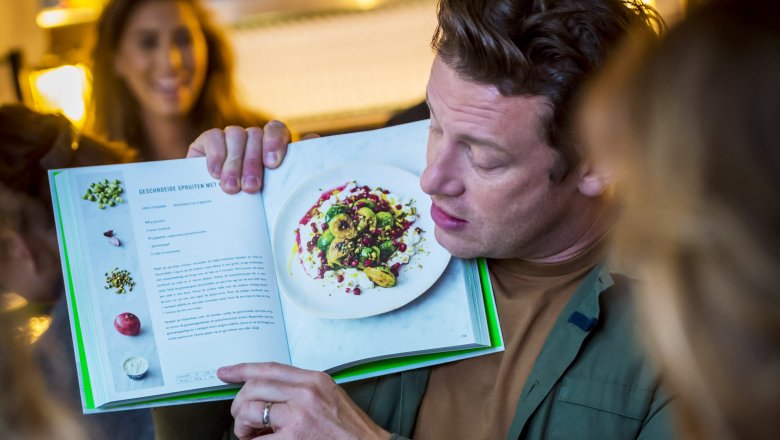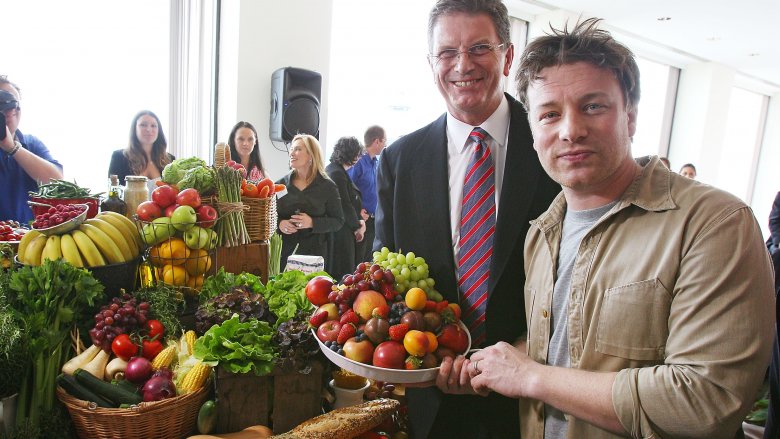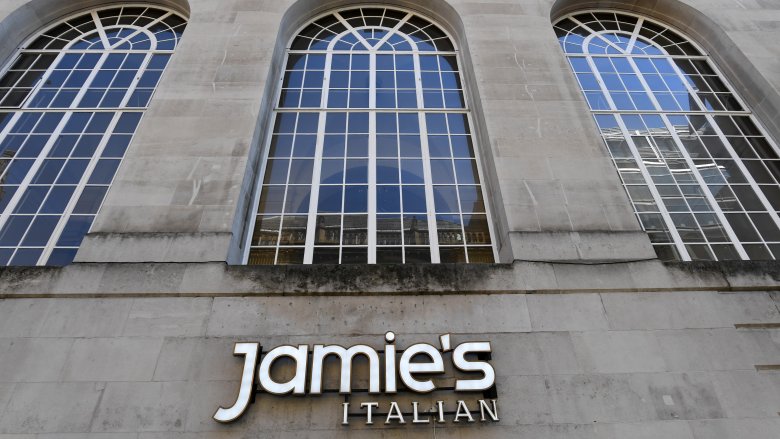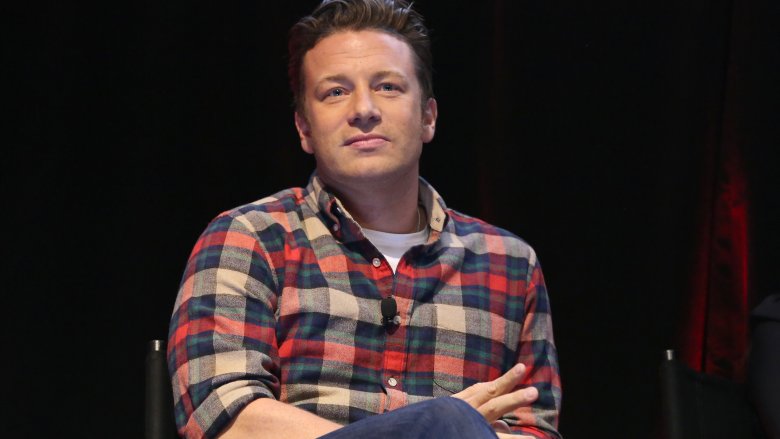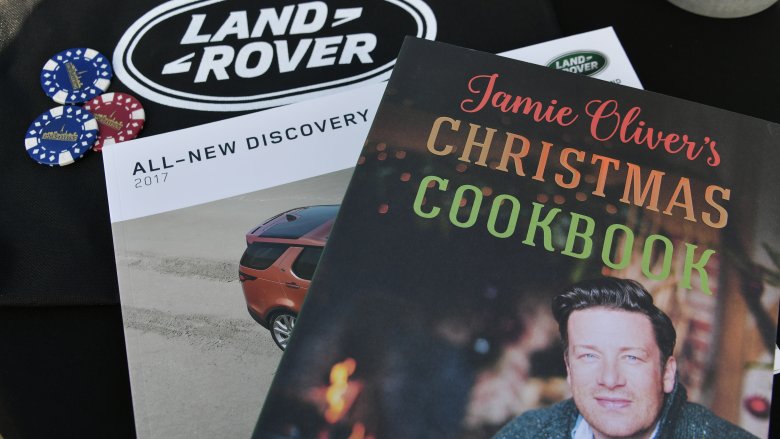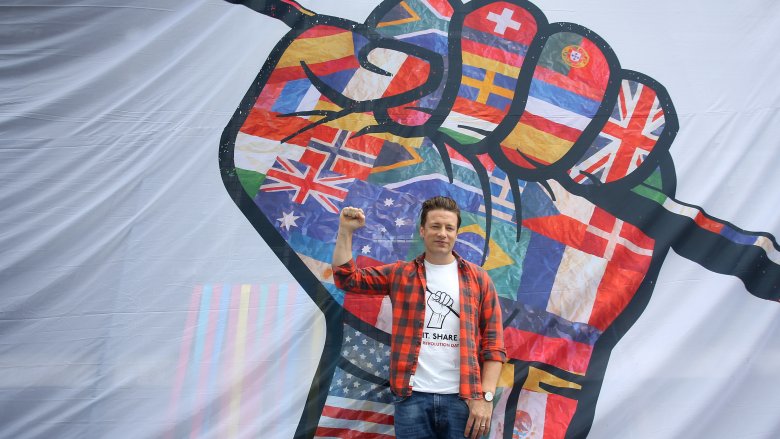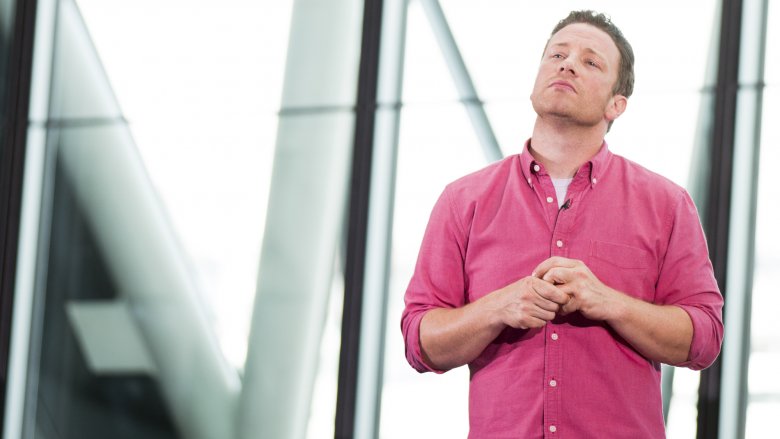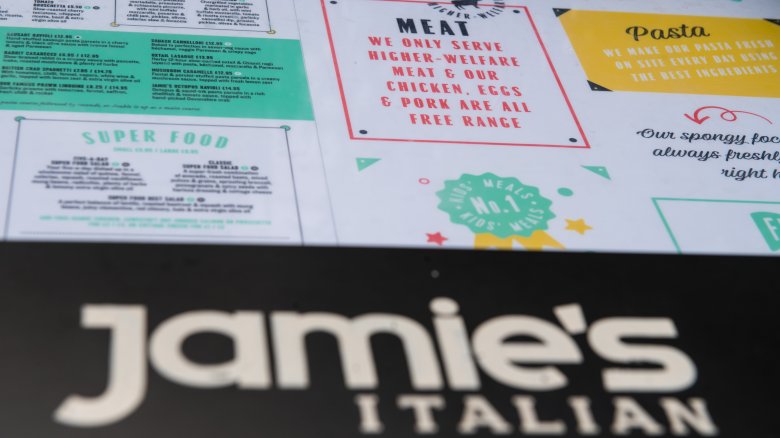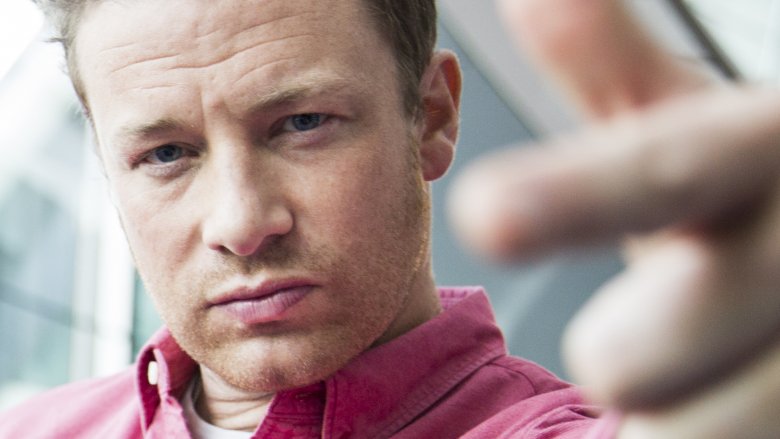The Real Reason Jamie Oliver's Restaurant Empire Is Collapsing
Owning your own restaurant is a secret dream for a lot of people, and when you're a celebrity chef, it might seem like you're being handed not only the opportunity, but a guaranteed success. That's not the case, though, and in May 2019 one of the world's biggest celebrity chefs — Jamie Oliver — saw his restaurant empire come crashing down.
According to The Guardian, only three of the chef's 25 UK restaurants will remain open, though the advisory firm called in to sort out the mess searched for a buyer for those remaining restaurants, meaning their fate has yet to be determined. The rest would be gone, immediately.
Oliver had this to say about the closures: "I am deeply saddened by this outcome and would like to thank all of the staff and our suppliers who have put their hearts and souls into this business for over a decade. I appreciate how difficult this is for everyone affected. I would also like to thank all the customers who have enjoyed and supported us over the last decade, it's been a real pleasure serving you."
And it has been just over a decade since Oliver's Jamie's Italian brand of restaurants first launched in 2008. How could such a popular celebrity's restaurant empire fall so far, so fast?
He's been struggling for a long time
This massive 2019 closure isn't the first time Jamie Oliver has shuttered doors. In 2014, The Guardian reported on another set of Oliver-inspired restaurants — Union Jacks — that were closing. They also said that the small chain's failure wasn't all that surprising, calling the fare "good but relatively ... commonplace," and let's be honest, no one goes out to eat and expects commonplace food.
And The Guardian has also reported that Oliver's restaurants have been in trouble for a long, long time. In 2017, they released the numbers from the previous year and revealed that while they had logged a £2.4 million ($3 million USD) profit in 2015, 2016 brought with it a £9.9 million ($12.6 million USD) loss. A huge part of that loss came because Oliver backed out of a project that had been planned for King's Cross, and they were quick to point out that in spite of that massive loss, things were still going pretty well. That's what they said, at least, but by 2018 The Telegraph was reporting some of Jamie's Italian's 40+ locations were going to be closing.
But there were other things going on, too, amid some massive personnel turnover. Oliver closed his chain of cookery shops, Recipease, in 2015. The presses stopped rolling on his self-titled food magazine, Jamie, in 2017 (via The Guardian). That's a lot of stuff coming to a close.
There's a reason finding the truth has been tough
According to Bloomberg, the 2019 announcement of insolvency came with the immediate closure of Jamie's Italian, Barbecoa, and Fifteen London restaurants. In 2018, there had been another announcement — The Telegraph reported Jamie's Italian was closing 12 locations and asking for their rent to be lowered at another 11. They were struggling with massive debts, but finding out just what was going on with the celebrity chef's chain was difficult. Why? Because, it came out, the hundreds of people who suddenly found themselves unemployed were instructed to sign non-disclosure agreements preventing them from discussing anything about the situation — and that included making any comments about Oliver or his family.
That sounds odd, at first, until you learn that former staff members — many speaking anonymously — had come out to blame Oliver's brother-in-law, Paul Hunt, for the massive failures suffered by the restaurants. Only one person — former managing director of Jamie Oliver LTD, Tara Donovan — went on record saying that all the criticism was being put out there for a reason.
Insiders blamed some poorly chosen nepotism
Sure, it might be easy to accept the fact that the life of a celebrity chef is busy, and they can't be everywhere at once. But when it came time for Oliver to appoint a CEO in 2014, he chose his own brother-in-law, Paul Hunt. According to insiders (via Eater London), it was all downhill from there.
Hunt — who had been previously convicted of insider trading — was brought in when there were 42 Jamie's Italian locations. Five years later and, well, we all know where this story goes, even though Oliver had claimed Hunt "radically transformed" his business into something "more successful, vibrant, and creative". Employees didn't agree, saying Hunt had a tendency to mistreat staff and fire anyone he viewed as "strong" — including a PA who learned she was being fired when she was told to type up her own redundancy letter.
Others described him as not having the foggiest idea about what he was doing, and allegations in The Times labeled him a "bully who is destroying his business empire" and just plain "incompetent." One senior exec went so far as to say (via The Telegraph) "He's running the business into the ground, and the day he resigns the staff should have a big party."
Brexit might be to blame… already
It's been a slow rollout of closures for Jamie's Italian over the course of a few years, and in January 2017, The Guardian reported that he was going to be closing six locations — including a restaurant in Aberdeen and one near St. Paul's Cathedral in London. The reason? It was reported that the closures were coming — in part — so Oliver could focus more on Barbecoa and international endeavors, and it was also in part because they were experiencing all kinds of "pressures and unknowns" following the Brexit vote.
To be fair, there are still a lot of unknowns regarding Brexit in 2019, but representative Simon Blagden said (via ITV) a huge part of the problem Oliver's restaurant were having was because of the collapse of the pound and an increase in the costs of importing ingredients from Italy. In order to stay viable, each restaurant needed to average about 3,000 covers a week — and those just didn't make the cut.
There was nothing getting fans into the restaurant
According to CNBC, Oliver saw his business failing in 2018, and claimed he had learned some valuable lessons from it. Did he? Given the following year's news that's uncertain, but he did say they had started to realize that not only did it take time to get something as big and complicated as a restaurant right, but that it wasn't going to happen just because the person with the name on the door was famous.
Jon Knight, CEO of the Jamie Oliver Restaurant Group in 2017, said the disconnect between Oliver's image and his restaurants as a huge problem.
"The customer would go and buy Jamie's latest book, would sit at home and watch Jamie on Channel 4, but then he or she would go out to eat at (competitor chain) Prezzo. That was our problem," he said. Just what the disconnect was, he didn't specify, but they did say that part of the fix was lowering restaurant prices to try to unify the brand.
They owe an insane amount of money
According to The New York Times, Oliver started looking for a buyer to help save his restaurants in late 2018 — though a buyer didn't materialize as fast as Oliver would have liked. Will Wright of KPMG, one of the administrators brought in at the start of the closures, had this to say:
"The current trading environment for companies across the casual dining sector is as tough as I've ever seen. The directors at Jamie Oliver Restaurant Group have worked tirelessly to stabilize the business against a backdrop of rising costs and brittle consumer confidence."
But they were fighting an uphill battle. In early 2018, The Guardian got a peek at court documents that detailed just how much Oliver's restaurants were carrying in debt — and it was no small amount. Jamie's Italian alone had £71.5 million ($90.8 million USD) in debt, including £31.2 million ($39.6 million USD) in overdrafts and loans, £41.3 million ($52.4 million USD) owed to various creditors (like landlords), and £2.2 million ($2.7 million USD) overdue to staff. Oliver's representatives were quick to call the debt "standard" for organizations, and stressed that there was no one out there actually waiting for money. Documents, though, suggested the writing was already on the wall.
Too much, too fast, in all the wrong places
Sometimes, it takes failure to learn some very important lessons, and when he talked about his restaurant difficulties in 2018 (via CNBC), he said he had learned a lot — and knew what he would go back and change.
One of those things was that there was a danger in opening too many places too fast, and Oliver empire exec Jon Knight said he had made the mistake of "opening too many restaurants, too quickly, in the wrong places" and that's a huge miscalculation. Oliver added, "In the future, I might spend a bit more time getting in second and getting it right."
Knight continued (via Eater London) about just what they meant. They said they had overlooked two key factors when it came to getting in the right place, and didn't pick places with enough of a tourist draw or a university crowd. Because, let's face it — going out to a celebrity chef's restaurant (where the "entry-level steak" alone was priced at £15.50 ($20 USD)) isn't a normal night out for most families. It's perfect for vacations, though, and tourists are a prime market, so it's too bad they didn't take more advantage of that.
His attempts to save it
When Oliver's chain faced insolvency in 2019, it was actually the second time it had gotten that bad. The first time it happened — in September 2017 — Oliver was able to pull off a last-minute save by dumping almost £13 million ($16.5 million USD) of his own money into the business.
And, he did it just hours before they were going to have to make the decision to pull the plug.
According to The Guardian, Oliver was — at the time — a bit mystified about what had gone wrong. He told the Financial Times, "We had simply run out of cash. ... And we hadn't expected it. That is just not normal, in any business. You have quarterly meetings. You do board meetings. People supposed to manage that stuff should manage that stuff."
In addition to that, it took another £37 million ($46.8 million USD) in loans and subsidies from other parts of Oliver's business empire to shore up the ailing restaurants, and Oliver called it all "the perfect storm: rents, rates, the high street declining, food costs, Brexit, increase in the minimum wage. There was a lot going on."
And it's continued to go on.
He's said he's not good at business
Should Jamie Oliver just stick to the cooking? Maybe, especially based on the fact that he told Cannes Lions festival PR chief Richard Edelman this (via The Guardian) in 2015:
"... I worked out the other day, I took a little review of my 17 years — we've done all right, I've sold a few books and we've made a few quid — I realized that I think I wasted and f***ed up about 40 percent."
That "few quid" he's made was, at the time, estimated by the Sunday Times Rich List to be about £180 million ($228 million USD), and Oliver says that other 40 percent of endeavors that had failed were "quite painful." He also said that he wasn't completely wasting those failures, saying, "Did the mistakes not teach me powerful lessons? I'm trying to turn those mistakes into what maybe you guys call R&D. What is the percentage of turnover that is right for innovation. What is healthy? Is it 10 percent, 20 percent? Is 40 percent reckless?"
He's a massively polarizing figure
Here's the thing about celebrity restaurants: they rely heavily on the draw of the celebrity to get people in the door. Only Jamie Oliver has a tendency to make people very angry.
Take the UK's decision to put a tax on high-sugar soft drinks. He championed it, (via The Telegraph) and media outlets like the Spectator pointed out the hypocrisy: he still sold cookbooks that included recipes containing high-sugar desserts, and sold sugary drinks at his restaurants... just at a higher price than other drinks. Oops?
That's just the start, and almost everyone can find something in Oliver's past to be angry about. There's the time he united Spain in their collective outrage over his "paella" recipe (via The Guardian) and the time he was accused of cultural appropriation with his "jerk rice" (via The Conversation). Then there was the outrage sparked when he started to talk about why all women needed to breastfeed (via The Telegraph), the time he was sued by a beef processor for comments about "pink slime" (comments which led to an 80 percent sales drop for the company and 700 people being laid off, says the Independent), and the time he accused a West Virginia mother of slowly killing her children with food (via The Atlantic). He tried the same thing in LA schools, and fared less well: NPR says he was kicked out.
Why would any of the people he's angered want to go eat at his restaurants?
Skyrocketing costs across the board
The fall of Oliver's restaurant empire is pretty high-profile, but according to The Telegraph, he's not alone in some of the problems he's facing: they're hitting other restaurants, too — we just don't hear about them as much.
Alongside Jamie's Italian and Fifteen, restaurants on an unprecedented scale are failing. Numbers of closures, they say, are up 35 percent from the previous year. Even as Time cited huge problems like consistently rising rent costs and relentlessly rising food prices, it's important to note that he's not the only one struggling. In 2018, UK Hospitality reported that the costs of running a restaurant had hit a new, 12-year high. Payroll costs were up and profit margins were shrinking, all while food sales remained stagnant and drink sales took a nosedive.
And on the other side of the pond, similar trends are being seen in the U.S. Steakhouses have been struggling under increased cost of doing business, and it's taking a toll on chains like The Cheesecake Factory and Outback. And that's food for thought, the next time you and your family decide to eat out. Make your business count — livelihoods are depending on it.
What it means for his employees
When everyone talks about Jamie Oliver's restaurant empire falling, they tend to talk about Jamie Oliver. But it's important to remember that other lives are being changed, too.
According to Sky News, 2019's insolvency means that around 1,300 people are now without work. And that's not the first time that hundreds of people have lost their jobs or been laid off because of the financial difficulties that developed around Oliver's restaurants.
When he closed 12 locations in 2018, The Telegraph reported that more than 600 people saw their jobs disappear overnight. And that's way more than they originally thought would be lost — according to the Independent, it was first estimated that the closure and restructuring plan was going to put around 200 jobs at risk, with many people going through consultation periods to be moved elsewhere within Oliver's companies. The resulting job loss is a tragedy that all too often gets overlooked when news like this hits the headlines.
Don't feel too bad for him
At the end of the day, you don't have to worry about Oliver. Sure, he closed a huge number of restaurants, but he's fine. According to the BBC, not all of his restaurants are going to be closing, and those that are under the control of franchisees — like his international ventures — will stay open.
The Guardian took a look at Oliver's other holdings, and found that his restaurants are only a small portion of the empire he's built. Jamie Oliver Holdings — which includes his book and television ventures — is still pulling in millions, especially with help from his best-selling cookbooks. He also has a huge stake in licensing agreements, which is a division that basically oversees his partnership with various companies (like Tefal and Hotpoint) and stores to put his name and image on merchandise.
House Beautiful reported that he and his family bought a new family home in Hampstead in 2015, estimated to be worth somewhere around £8.9 million ($11.3 million USD). Hello! then later reported that they were adding to their homes with the subsequent purchase of a 70-acre, 16th century mansion in Essex, a country home worth around £6 million ($7.6 million USD). He's not going anywhere soon.
